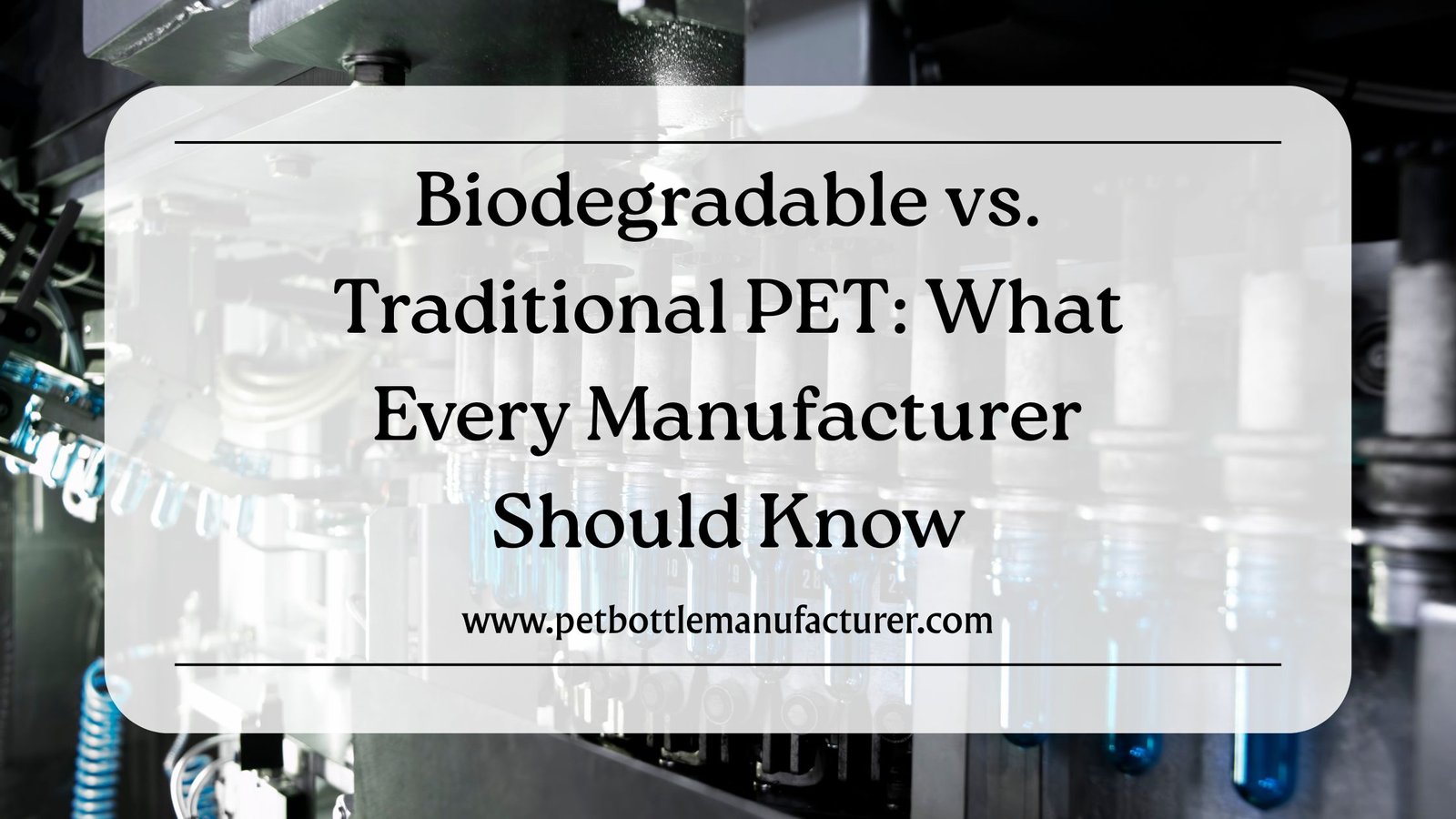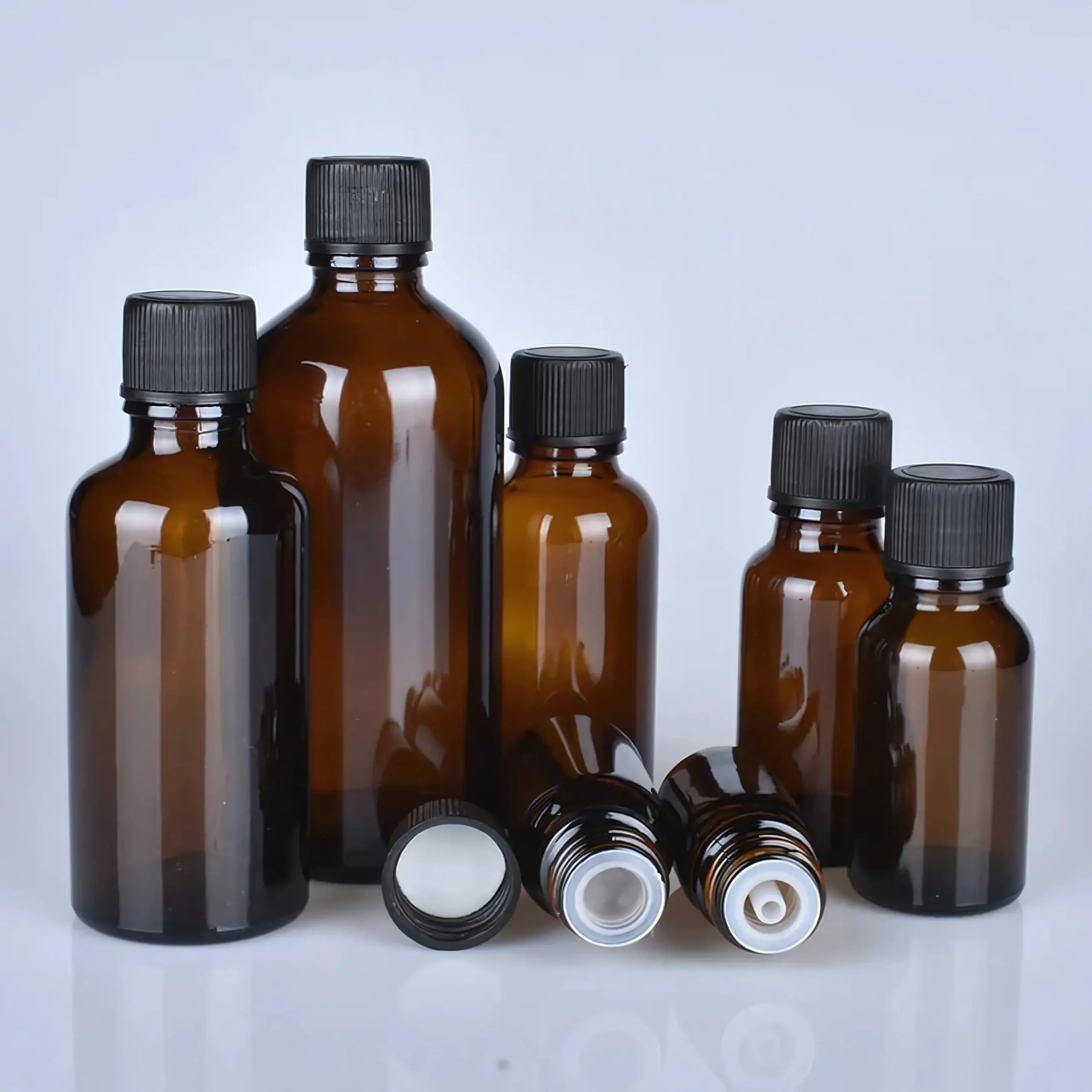Biodegradable vs. Traditional PET: What Every Manufacturer Should Know

In today’s world, sustainability is no longer optional—it is essential. Businesses across industries are re-evaluating their operations to minimize environmental impact while maintaining product quality. In packaging, PET (polyethylene terephthalate) bottles are one of the most commonly used materials, especially in beverages, cosmetics, and pharmaceutical sectors.
Shree Balaji Enterprise, a trusted PET Bottle Manufacturer in India, has been at the forefront of producing both traditional and biodegradable PET bottles, helping brands align with environmental goals without compromising quality.
This guide explores the differences between biodegradable PET bottles and traditional PET bottles, their environmental impact, and why manufacturers need to consider switching to sustainable alternatives.
Understanding PET and Its Importance
PET is a versatile thermoplastic polymer used for packaging due to its lightweight, transparency, strength, and ability to preserve contents. These properties make PET ideal for:
- Soft drink bottles
- Water bottles
- Cosmetic containers
- Pharmaceutical packaging
Traditional PET bottles have been widely used for decades because they are strong, lightweight, and cost-effective. However, one major drawback is their environmental footprint. PET bottles do not degrade naturally and can take hundreds of years to break down in landfills, creating long-term environmental problems.
Traditional PET Bottles
Traditional PET bottles are manufactured from virgin PET resin or recycled PET. They are the backbone of beverage and consumer product packaging due to their affordability and reliability.
Advantages of Traditional PET Bottles:
- High durability ensures minimal breakage and leakage.
- Lightweight design reduces shipping and transportation costs.
- Cost-effective for large-scale manufacturing.
- Recyclable multiple times if processed correctly.
Challenges of Traditional PET Bottles:
- Non-biodegradable, contributing to environmental pollution if not recycled.
- Accumulation in landfills and oceans poses a severe ecological threat.
- Growing regulatory pressures on single-use plastics.
- Rising consumer awareness and preference for sustainable packaging solutions.
Traditional PET bottles are reliable but increasingly criticized for their long-term environmental impact.
Biodegradable PET Bottles
Biodegradable PET bottles are engineered using materials or additives that allow them to break down more quickly under natural conditions. This innovation addresses the growing demand for sustainable packaging without compromising durability and safety.
Key Benefits of Biodegradable PET Bottles:
- Environmentally friendly and reduce plastic pollution.
- Can be designed to decompose under specific conditions, such as industrial composting or microbial activity.
- Appeal to eco-conscious consumers and enhance brand image.
- Reduce long-term waste management costs for manufacturers.
Challenges of Biodegradable PET Bottles:
- Slightly higher production costs compared to traditional PET.
- Requires proper disposal methods to ensure complete decomposition.
- Raw material availability may be limited.
- Certain recycling processes for traditional PET may not be compatible with biodegradable PET.
Despite the challenges, biodegradable PET bottles represent a critical step toward sustainable packaging solutions.
Environmental Impact
Traditional PET bottles, while recyclable, pose environmental concerns if they are not processed properly. Millions of tons of PET waste end up in landfills, rivers, and oceans every year. Over time, this waste contributes to soil contamination, water pollution, and harms wildlife.
Biodegradable PET bottles mitigate these issues. They are designed to decompose faster, either in composting facilities or through microbial activity. This reduces the accumulation of plastic waste in the environment, supporting sustainable production and consumption cycles.
For manufacturers, adopting biodegradable PET is not only environmentally responsible but also positions the brand as a leader in sustainability.
Why Manufacturers Should Consider Biodegradable PET
Manufacturers who invest in biodegradable PET bottles gain several strategic advantages:
1. Regulatory Compliance:
Governments around the world are tightening regulations on single-use plastics. Switching to biodegradable PET ensures compliance with environmental laws, avoiding penalties and restrictions.
2. Brand Reputation:
Consumers increasingly prefer brands that are eco-conscious. Using biodegradable PET bottles enhances corporate social responsibility and strengthens brand perception.
3. Waste Reduction:
Biodegradable bottles reduce landfill burden and minimize environmental impact, helping manufacturers contribute to global sustainability efforts.
4. Market Differentiation:
Eco-friendly packaging sets a brand apart in a competitive market. It allows companies to appeal to environmentally conscious consumers willing to pay a premium for sustainable products.
5. Long-Term Cost Benefits:
While production costs may be higher, reduced waste management and improved brand reputation lead to long-term financial benefits.
Shree Balaji Enterprise: Leading the Way in Sustainable PET Solutions
As a trusted PET Bottle Manufacturer, Shree Balaji Enterprise offers a full spectrum of PET bottle solutions for brands that value quality, sustainability, and compliance.
What Sets Shree Balaji Enterprise Apart:
- Diverse Product Range: Traditional PET bottles for cost-sensitive products and biodegradable PET bottles for eco-conscious brands.
- Customization: Bottles of various sizes, shapes, and designs tailored to brand needs.
- High Quality: Food-grade, durable, and compatible with automated filling systems.
- Sustainability Expertise: Guidance on selecting the right PET solution for environmental goals.
- Reliability: On-time delivery and adherence to international manufacturing standards.
Manufacturers partnering with Shree Balaji Enterprise can confidently transition to sustainable packaging without compromising on quality or operational efficiency.
Making the Right Choice
When deciding between traditional and biodegradable PET bottles, manufacturers should consider several factors:
- Product Type and Shelf Life: Beverages, cosmetics, and pharmaceuticals have different storage and durability requirements.
- Consumer Expectations: Are your customers eco-conscious and willing to support sustainable packaging?
- Cost Considerations: Analyze long-term cost savings from waste reduction, compliance, and brand value.
- Supply Chain and Disposal: Ensure proper infrastructure exists for biodegradable PET to fully decompose.
- Regulatory Environment: Stay ahead of evolving government policies on plastics.
A balanced decision ensures brands meet sustainability goals while maintaining product integrity and profitability.
The Future of PET Bottles
The future of PET packaging lies in innovation and sustainability. Industry trends indicate a shift toward:
- Fully biodegradable and compostable PET bottles
- Hybrid solutions combining recycled PET with biodegradable polymers
- Lightweight designs reducing plastic usage
- Smart packaging solutions that support circular economy initiatives
Shree Balaji Enterprise is actively investing in such technologies, ensuring their PET bottles meet future regulatory standards and consumer expectations.
Manufacturers who adopt these solutions early will gain a competitive edge, reduce environmental impact, and strengthen brand loyalty.
Final Thoughts
Both traditional and biodegradable PET bottles have roles in modern packaging. Traditional PET offers durability and affordability, while biodegradable PET aligns with sustainability trends and regulatory requirements.
As a trusted PET Bottle Manufacturer, Shree Balaji Enterprise helps brands navigate this transition seamlessly. With high-quality, customizable, and eco-friendly solutions, they empower manufacturers to produce bottles that meet consumer demands, comply with regulations, and protect the environment.
Switching to biodegradable PET is not just a trend—it is a strategic move that benefits both businesses and the planet.

